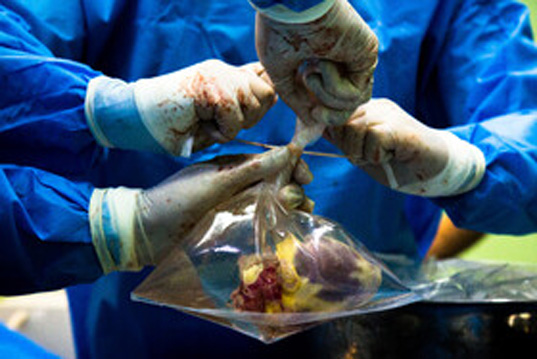Heart Valve Surgery in Iran
Best Hospital
We Introduce Best Hospital for General Heart Surgery
Best Doctors
We Introduce Best Doctors for General Heart Surgery
Best Price
We Try to introduce best Services with Regular Price



What is congenital valve disease?
It is said that you have a congenital valve disease in which one or more of the valves do not grow properly before birth, so that this problem may cause the valve to not close completely, so that blood flows backwards. It finds and the heart has to work with maximum force and much more intensity to pump it again, this pressure can cause serious problems such as dilated cardiomyopathy, heart failure and aortic aneurysm. Heart valve surgery is performed to repair or replace a valve in the heart that is not working properly due to heart valve disease. Heart valve surgery is open heart surgery through the sternum to the chest. During the operation in the hospital, the surgeon opens your chest to reach the patient's heart and valve. This procedure varies from patient to patient and takes at least two hours and often longer. During this time you are asleep under general anesthesia. Most heart valve surgeries are performed on the mitral and aortic valves. These two valves are more at risk for disease. These two valves also play a more vital role in the overall activity of the heart.
Fewer hospitals use newer, less invasive methods to treat some types of valvular heart disease.
In severely damaged and narrowed valves, balloon repair of the valve (dilation of the valve using a catheter with a balloon tip) or surgical repair and replacement of the valve may be necessary. Catheter repair is a low-risk, less invasive procedure. In this procedure, the valve is repaired using a catheter that enters the heart through an artery.
Other types of valve repair or replacement are almost always performed with open heart surgery, that is, under general anesthesia, the sternum is dissected and a cardiopulmonary device replaces the heart during surgery.
A cardiologist and a heart surgeon will usually consult with you to determine which treatment is best. Even if you do not have clinical signs of the disease, it is sometimes necessary to use these methods to prevent heart damage.
Symptoms of congenital valvular disease include:
faint
Chest pain
Dizziness or fainting
Fatigue
Shortness of breath
Murmur or stronger heartbeat
Worsening symptoms with physical activity
Diagnosis of congenital valve disease
Among the tests that your doctor will prescribe for you, in addition to the physical examination and Rajab’s question, are the following symptoms and family history for the correct diagnosis and the start of basic treatment:
Cardiac catheterization
Echocardiogram, including transesophageal echocardiography (TEE)
Chest X-ray, CT scan or MRI
Electrocardiogram (EKG)
Genetic testing
Due to the high growth rate of this disease in different countries in the world, in addition to doctors and cardiologists who are very capable of diagnosing and treating (medical and surgical) disease, with the most skilled specialists and genetic consultants, In order to receive the latest treatments, care and advice that anyone with a previous history of this disease needs, we have provided it to you dear ones.
Contact us for a free consultation on cardiovascular disease
How long does it take for the heart valve to heal after surgery?
Patients stay in the hospital for approximately five to seven days after each heart valve replacement surgery. Painkillers are most likely to be used after surgery because of the pain you are feeling.
For the first few days after surgery, your blood pressure, respiration and heart rate are constantly monitored.
Because the progression of heart valve disease may be different and unpredictable in each individual, the time and duration of treatment for these diseases varies from patient to patient and from surgery to surgery.
Complete recovery may take weeks or even months, depending on the extent of the recovery and the type of surgery performed.
What kind of food should be used after heart valve surgery?
Because valve surgery is a very important surgical procedure, postoperative care is also very important, so patients should pay close attention to postoperative care, including nutrition. After valve surgery, you should focus on eating a healthy diet. It helps your body heal and reduces the risk of complications and enables you to heal well.
Lean proteins are one of the best dietary options available after valve surgery. Proteins contain amino acids that can help regenerate tissue. Amino acids can also produce collagen and thus protect the skin; Therefore, these nutrients are important to prevent infection in surgical wounds.
For the first 3 months after surgery, your sense of smell or taste may change, but do not stop eating, as it will slow down your healing process.
In addition to proteins, which are very important, diets rich in fruits, vegetables, whole grains and nuts are very nutritious for people who have had heart surgery and can restore your strength.
Ideally, your diet should include the following:
1-Fish: Omega-3 fatty acids in fish are good for heart health. People eat fish at least twice a week because it is rich in unsaturated fats. Unsaturated fats in fish contain omega-3 fatty acids. Omega-3 fatty acids and other nutrients in fish can be good for heart health and prevent potential risks to the heart.
2-Meat or meat substitutes such as eggs, tofu, legumes and nuts
3-Whole grains: Good choices for whole grains include whole meals or whole grain breads or crackers, brown rice, whole grain pasta, quinoa, fries, oats, rye, oats, polenta and couscous.
4-Use low-fat dairy products to improve your heart health.
5-Drink water and avoid sugary liquids such as soft drinks or alcohol.
6-Target daily consumption of fruits, vegetables and whole grains depending on your energy needs. Here are some tips to help you eat well:
Minimize your salt intake as it helps lower blood pressure and prevent fluid retention.
– Do not eat sugary foods as much as you can, because it will have nothing for you but weight gain.
What medications should be taken after heart valve surgery?
After the replacement or surgery of the heart valves in the first days that you are under the direct supervision and treatment of your doctor in the hospital, after the patient’s condition stabilizes, he is released from the hospital and undergoes medical treatment.
Medications used before surgery for heart failure or coronary artery stenosis should continue, according to the treating physician, after valve replacement surgery. In addition to the previous medications that your doctor will tell you to use again or not, new medications will also be added. In addition to valvular disease, patients usually have other heart conditions before valvular surgery that they take medication to treat.
Angiology
Coronary angiography is a technique of imaging that uses X-ray to view blood vessels and identify any abnormality ...
General Heart Surgery
One of the more commonly known cardiac surgery procedures is the coronary artery bypass graft (CABG)...
Ischemic Heart Disease
Ischemic means that an organ (e.g., the heart) is not getting enough blood and oxygen. Ischemic heart disease, also...
Heart Bypass Surgery
Heart bypass surgery has been a life-saving treatment for more than 60 years.It is the most frequently performed openheart..
Heart Transplant
In heart transplant surgery, the patient’s heart is replaced by a natural heart from a donor who died recently or may be...
Open Heart Surgery
Open (traditional) heart surgery is when the chest is cut open and surgery is performed on the muscles, valves, or arteries of ...
Angioplasty
Coronary angioplasty is a treatment intended to fix narrowed or clogged arteries with the aim of enhancing blood ...
Echo
Echocardiography test is a procedure that uses ultrasound waves to take real-time images called echocardiogram …
A common and approved anticoagulant by cardiologists is often used for patients with artificial valves, warfarin. The test that is done before giving a warfarin pill is to measure the “PT” of the blood.
Other anticoagulants used for patients with artificial valves include aspirin 75 to 100 mg daily.
In addition to anticoagulants, you should take painkillers and antibiotics to reduce the chance of infection.
It should be noted that your doctor will give you medicine and you do not have to take medicine according to others, and this is so that you have a post-operative vision for your medicine. Medications work best for patients after surgery or heart valve replacement when they also consider things like exercising, not smoking, and eating a healthy diet.
The World Health Tourism Team intends to broadcast slowly in Iran. In addition to providing services for your greater comfort before and after the operation, having an experienced staff of specialists, doctors and nurses will ease your mind for complete recovery after surgery.
Valve repair or replacement, using minimally invasive or open heart procedures, such as balloon valvuloplasty. This common and very successful method is performed by capable Iranian cardiologists, and one of the very happy news in this field is that patients will not undergo surgeries and highly invasive procedures.
We help you live well. And we are in Iran in person and online (free consultation) for you.
According to the CDC, about 25 percent of babies born with a congenital heart defect have a critical condition, meaning they will need surgery or other procedures in the first year of life.
Types of heart defects:
Aortic stenosis is a serious congenital defect.
This affects the flow of oxygen-rich blood away from the heart to the rest of the body and may lead to thickening of the left ventricular muscle because the pump has to work harder.
Aortic coarctation
Aortic coarctation (CoA) is where the main artery (aorta) narrows, meaning less blood can flow through it.
CoA can occur on its own or in combination with other types of heart defects, such as an interventricular septal defect or a defect known as an open arterial duct.
Narrowing can be severe and often requires treatment shortly after birth.
Abstein’s anomaly
Abstein’s abnormality is a rare form of congenital heart disease in which the right ventricle (tricuspid valve) that separates the right atrium and right ventricle does not grow properly.
This means that blood can flow wrongly into the heart, and the right ventricle may be smaller and less effective than usual.
Einstein’s abnormality can occur on its own, but often occurs with atrial septal defect.
Arterial duct opened
As the baby grows in the womb, a blood vessel called the arterial duct connects the pulmonary artery directly to the aorta. The arterial duct diverts blood from the lungs (which do not function normally before birth) to the aorta.
An open arterial canal is where this connection does not close as it was supposed to after birth. This means that extra blood is pumped to the lungs, forcing the heart and lungs to work harder.
Pulmonary valve stenosis
Pulmonary stenosis restricts blood flow from the lower right ventricle (called the ventricle) to the pulmonary arteries, sending less blood to the lungs.
Pulmonary stenosis is a defect in which the pulmonary valve, which controls blood flow from the right ventricle (right ventricle) to the lungs, is narrower than normal.
This means that the right heart pump has to work harder to pass blood through a narrowed valve to reach the lungs.
Talk to a heart nurse
contact us
What are the symptoms of congenital heart disease?
There are a variety of signs and symptoms of heart disease and heart failure that can start at birth but may not show up for the rest of your life.
They can include the following:
Weak pulse or heartbeat
Excessive drowsiness
Heart murmur (a rotating sound made by the heart that may indicate abnormal blood flow)
Cyanosis (bluish skin, lips or nails)
Rapid breathing or difficulty breathing
Fatigue (severe fatigue)
Abnormal fatigue or shortness of breath during exercise
Poor blood circulation
What causes congenital heart disease?
In the first trimester of pregnancy, in the process of fetal heart development, Congenital Heart Defect is basically structural or functional abnormalities and defects that occur. The extent of injury varies from baby to baby. There may be only a simple problem with the wall between the atria of the heart, or this defect can be seen in different parts of the heart. Congenital heart defects can be detected during pregnancy or after birth. To diagnose these defects, doctors perform special tests and diagnose them.
Scientists and specialists do not fully know the cause of this disease, but the following reasons could be the causes of these congenital diseases:
Genetic issues and the presence of abnormal chromosomes
Tobacco use and alcohol consumption during pregnancy
Maternal diseases during pregnancy (diabetes, medication, phenylketonuria or viral infection)
When to see a doctor
See your doctor if you have symptoms that may indicate heart valve disease. If you have heart murmurs, your doctor may suggest that you see a cardiologist.
Who is a candidate for minimally invasive mitral valve surgery?
Mitral valve repair is the gold standard procedure for patients who need surgery due to mitral valve disease. This is especially important in degenerative disease conditions where the recovery rate is close to 100% achievable. Many patients today are candidates for less invasive mitral valve surgery. Minimally invasive surgery should ensure the safety of the procedure and the surgeon’s ability to perform permanent mitral valve repair.
Who is not a good candidate for minimally invasive mitral valve surgery?
Not all of our patients are suitable for minimally invasive surgery. Operation through small incisions is technically more challenging and in some cases can reduce the safety of the operation. Patients who require additional cardiac procedures such as coronary artery bypass graft surgery, the elderly, patients with very diseased arteries, and patients with very weak hearts are often not suitable for this approach.
About the world of quiet broadcasting
Jahan Pakhsh Aram Health Tourism is an online medical tourism platform where you can find the best heart surgeons in Iran. The price of mitral valve replacement in Iran varies depending on the individual and is determined by a face-to-face examination with a physician.
For more information about the cost of replacing the mitral valve in Iran and to schedule an appointment, you can contact Jahan Pakhsh Aram Consultants via WhatsApp at +91 + 989120131750- and + 989021236092. This service is completely free.
How successful is heart valve replacement surgery?
A faulty valve has only two flaps, so it is called a double valve. A recent study found that aortic valve replacement surgery had a 94% five-year survival rate.
Is heart valve replacement surgery dangerous?
Repairing or replacing the valve is generally safe. However, as with any surgery or procedure, complications may occur. The potential risks of heart valve repair or replacement surgery include: Bleeding during or after surgery. Blood clots that can cause heart attack, stroke, lung problems and irregular heart rhythm (arrhythmia).
Your treatment team will monitor your condition and look for signs of infection at your incision. The team of doctors and nurses of Jahan Broadcast in Iran will check your blood pressure, respiration and heart rate. He will work with you to manage any pain, problems, etc. that you have after the surgery.
How much does heart valve replacement surgery cost in Iran?
Plan your heart surgery in Iran with the best heart surgeon.
Jahan Pakhsh Aram Health Tourism is a medical tourism company in Iran that cooperates with the best heart surgeons, specialists and hospitals in Iran and offers the latest treatments in the world at an affordable cost.









